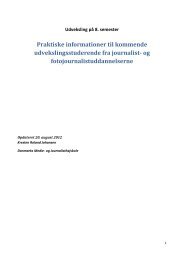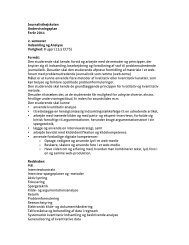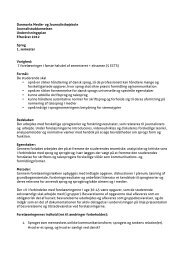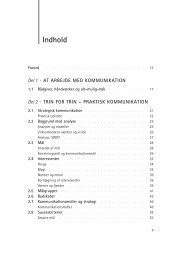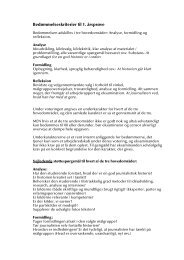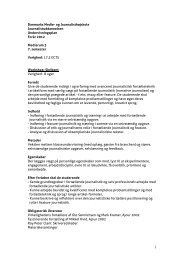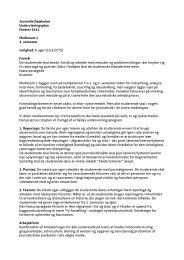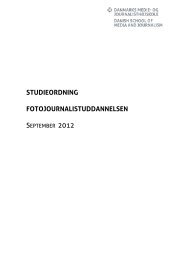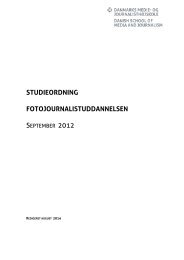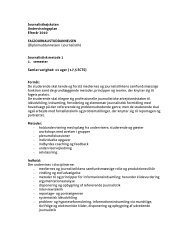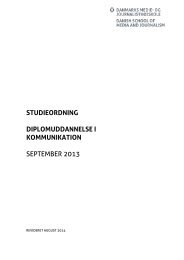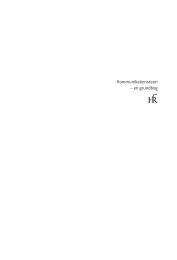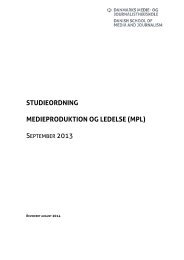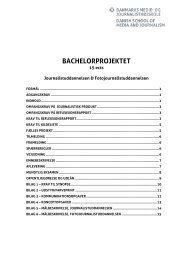Student Handbook
Student Handbook
Student Handbook
You also want an ePaper? Increase the reach of your titles
YUMPU automatically turns print PDFs into web optimized ePapers that Google loves.
What we expect from you<br />
The Basics<br />
We strive to provide you with high quality,<br />
dedicated teaching in the DMJX international<br />
programmes. The rules and the procedures that<br />
govern the Danish students at DMJX also apply to<br />
the international students:<br />
In particular we call your attention to the following<br />
facts:<br />
• Be punctual in class. Classes start on time.<br />
• Inform the teacher if you are not able to come<br />
to class, and if you are ill.<br />
• Respect deadlines.<br />
• If students fail to submit work by a deadline<br />
without first requesting permission for an<br />
extension and being granted an extension, the<br />
work will not be accepted and the result will be<br />
a fail.<br />
• Observe the program policy and the rules on<br />
plagiarism and fabrication.<br />
• Bear in mind that sources, experts or people<br />
that you interview should be treated cordially<br />
and respectfully. You should honour any<br />
promises made to them.<br />
Program Policy<br />
We strive at the Danish School of Media<br />
and Journalism to uphold the standards of<br />
excellence in Journalism.<br />
We require the students to uphold the IJF standards<br />
of journalism in all their work:<br />
The IFJ Declaration of Principles on the conduct of<br />
journalists:<br />
“This international declaration is proclaimed as a<br />
standard of professional conduct for journalists<br />
engaged in gathering, transmitting, disseminating<br />
and commenting on news and information in<br />
describing events.<br />
1. Respect for truth and for the right of the public<br />
to truth is the first duty of the journalist.<br />
2. In pursuance of this duty, the journalist shall at<br />
all times defend the principles of freedom in<br />
the honest collection and publication of news,<br />
and of the right of fair comment and criticism.<br />
3. The journalist shall report only in accordance<br />
with facts of which he/she knows the origin.<br />
The journalist shall not suppress essential<br />
information or falsify documents.<br />
4. The journalist shall use only fair methods to<br />
obtain news, photographs and documents.<br />
5. The journalist shall do the utmost to rectify<br />
any published information which is found to be<br />
harmfully inaccurate.<br />
6. The journalist shall observe professional<br />
secrecy regarding the source of information<br />
obtained in confidence.<br />
7. The journalist shall be aware of the danger of<br />
discrimination being furthered by the media,<br />
and shall do the utmost to avoid facilitating<br />
such discrimination based on, among other<br />
things, race, sex, sexual orientation, language,<br />
religion, political or other opinions, and<br />
national or social origins.<br />
8. The journalist shall regard as grave professional<br />
offences the following:<br />
• plagiarism;<br />
• malicious misrepresentation;<br />
• calumny, slander, libel, unfounded<br />
accusations;<br />
• acceptance of a bribe in any form in<br />
consideration of either publication or<br />
suppression.<br />
9. Journalists worthy of the name shall deem it<br />
their duty to observe faithfully the principles<br />
stated above. Within the general laws of each<br />
country the journalist shall recognise in professional<br />
matters the jurisdiction of colleagues<br />
only, to the exclusion of every kind of interference<br />
by governments or others.<br />
(Adopted by the 1954 World Congress of the IFJ.<br />
Amended by the 1986 World Congress.)<br />
When submitting your student work, be aware that<br />
plagiarism is presenting someone else’s words,<br />
images or other work as your own without credit or<br />
attribution. This includes quoting without proper<br />
attribution.<br />
Be aware that fabrication in the form of deliberately<br />
using bogus information is an act of dishonesty.<br />
Be aware that violations of the basic rules of<br />
journalism will result in failing the course where<br />
the violation occurs or in expulsion from the<br />
program. Written assignments are being checked by<br />
the plagiarism detection system Urkund.<br />
If you are in doubt consult your teacher.<br />
<strong>Student</strong> <strong>Handbook</strong> 2014 7



